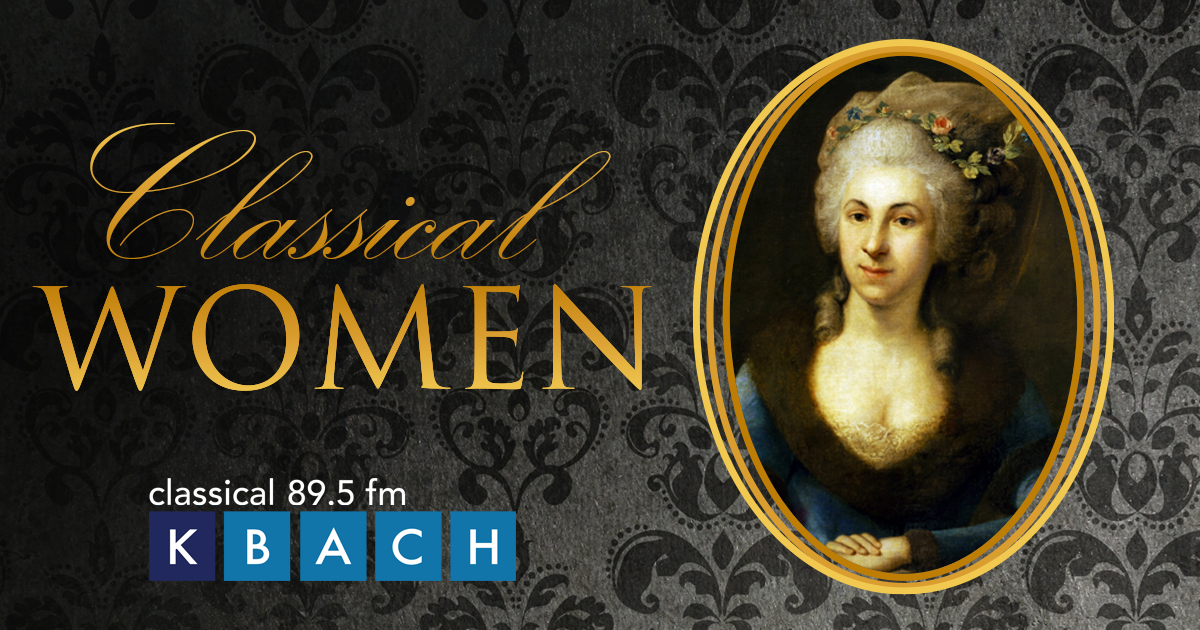
Social mores throughout history have meant that women often have not been celebrated for their contributions to classical music. KBACH is helping to change that. Be listening for works by these talented women:
Hildegard of Bingen (c. 1098 - 1179)
Saint Hildegard was a German Benedictine abbess who was a tremendously skilled writer and philosopher who also composed some of history's best sacred monophonic works. Several modern ensembles have recorded her Ordo virtutum (Order of the Virtues), the earliest known morality play.
Elisabeth Jacquet de La Guerre (1665 - 1729)
The French harpsichordist and composer was born into a wealthy family of musicians and musical instrument makers. At age five, her prodigious talent caught the attention of Louis XIV. After joining his court, Jacquet wrote most of her music for the Sun King. Her Sonata #2 in D for violin and continuo is a true Baroque gem.
Mademoiselle Duval (1718 - after 1775)
Duval was a French dancer and composer who wrote the second opera by a woman ever performed at the Paris Opera. It's an opera-ballet called Les Génies (The Geniuses) from 1736. You can hear a suite from it on KBACH. Amazing that she wrote such wonderful music and we don't even know her first name.
Princess Anna Amalia of Prussia (1723 - 1787)
A German princess and composer, Anna Amalia studied music under Johann Kirnberger, a student of J.S. Bach. Amalia wrote mostly chamber music, much of which is now lost, possibly destroyed by the highly self-critical composer herself, but you can hear her Flute Sonata in F on KBACH.
Marianna Martines (1744 - 1812)
Of Spanish descent, Martines was born in Vienna, where her father worked as a musician in the Pope's Embassy to the Austrian Empire. Growing up, her family lived in the same large building that was also home to a then-struggling, young musician, Franz Joseph Haydn. Later in life, he and Mozart were frequent guests at musical soirees that Martines held in her home. You can hear Marianna Martines' keyboard concertos on KBACH.
Josepha Barbara Auernhammer (1758 - 1820)
Imagine having Mozart as your teacher. Josepha Barbara Auernhammer could truly say she learned from the best. Not only was she taught by the Classical Era master, but she also performed with him on pieces requiring piano four-hands. Now, imagine Mozart dedicating some of his works to you. Yes, Auernhammer had that honor, as well. She lived almost 30 years after Mozart's death and became a respected concert pianist and teacher in Vienna, as well as a composer. Check out her Variations on a Hungarian Theme.
Maria Hester Park (1760 - 1813)
A British pianist, singer, and teacher, Maria Hester Park was also one of the most prolific female composers of the 18th century. She corresponded with Franz Joseph Haydn, and her keyboard sonatas show the influence of Mozart. Park was well acquainted with English nobility. She even gave piano lessons to the Duchess of Devonshire.
Hélène de Montgeroult (1764 - 1836)
Born in Lyon, Hélène de Montgeroult became one of her generation's best fortepiano performers. She was also a published composer of works that fall somewhere between Classical and Romantic. Montgeroult's biographer, Jérôme Dorival, described her as “the missing link between Mozart and Chopin.”
Marie Bigot (1786 - 1820)
Imagine counting Haydn, Beethoven, and Salieri among your friends. Marie Bigot was a well-known and accomplished pianist in Vienna. She was the first to play Beethoven's "Appassionata" Sonata. He even gave her the autograph of the score. After returning to her native France, Marie Bigot championed Beethoven's music in Paris and gave piano lessons to Felix and Fanny Mendelssohn. When you hear Bigot's Suite d'etudes on KBACH, you'll have a sense for how formidable a teacher she must have been.
Louise Farrenc (1804 - 1875)
Louise Farrenc is one of the often unsung composers of the Romantic Era. In her time, she was primarily known for virtuosic skill playing piano. She studied performance under masters such as Ignaz Moscheles and Johann Nepomuk Hummel. When Farrenc was just 15, she was accepted into the Conservatoire de Paris to study composition under Anton Reicha. Her output includes three symphonies, numerous chamber works, and many pieces for solo piano.
Fanny Mendelssohn (1805 - 1847)
Due to the social conventions of the day, many of Fanny's works went unpublished in her lifetime, and several were wrongly attributed to her younger brother, Felix Mendelssohn. Her Ostersonate (Easter Sonata), lost for 150 years, was discovered in 1970 bearing the inscription, "F. Mendelssohn." The handwriting, however, was Fanny's, and by 2010, research had concluded that this wonderful Romantic piece was indeed by Fanny Mendelssohn.
Emilie Mayer (1812 - 1883)
Though she got a relatively late start studying composition, aged 29, she left a large body of work, including eight symphonies, fifteen concert overtures, and many songs and chamber pieces. Her early compositions are very much in the Viennese Classical style, while her later works take on a more Romantic flavor. You'll hear the Hannover Piano Trio on KBACH performing three of her Piano Trios.
Clara Schumann (1819 - 1896)
A gifted pianist, Clara Schumann likely would be known more widely today, had the social structure of her day permitted women equal attention as composers. As wife to Robert Schumann, Clara exerted great influence over her husband's music. In fact, the world might not have known Robert if not for Clara. After hearing her play, a young Robert Schumann abandoned studying law for music. If it's been a while, revisit Clara's Piano Concerto in a.
Pauline Garcia Viardot (1821 - 1910)
If you'd lived in 19th century France, you would have known of this popular mezzo-soprano and composer. Of Spanish descent, Pauline Garcia Viardot was reknowned for her wide vocal range and dramatic roles on stage in France. Camille Saint-Saens dedicated Samson and Delilah to her. Viardot composed instrumental works, operas, choral pieces, and songs. Find a recording of Cecilia Bartoli singing Viardot's "Hai Luli." The melody will linger with you long after the song ends.
Queen Lydia Lili'uokalani (1838 - 1917)
Lili'uokalani was the last sovereign monarch of the Kingdom of Hawaii. She was also Hawaii's first and only female monarch. A music lover, Lili'uokalani wrote over 165 songs and chants, including the popular, "Aloha 'Oe", making her one of Hawaii's most accomplished musicians. Seek out her song, "Ke Aloha O Ka Haku" ("The Queen's Prayer"). She wrote it while under house arrest following the overthrow of her kingdom. The haunting, melancholic work highlights the pain, but also the faith, of Lili'uokalani.
Laura Netzel (1839 - 1927)
Though she remained proud of her Finnish heritage her whole life, Laura Netzel lived in Sweden from the time she was one year old. She studied piano and composition Charles-Marie Widor, and became a concert organizer, pianist, and conductor. Socially conscious, Netzel advocated for children, poor women, and workers. A good place to begin with her music is her Tarantelle, Op. 33, a furious two minutes of fun.
Elfrida Andrée (1841 - 1929)
A member of the Royal Swedish Academy of Music, Andrée was the first woman in Sweden to graduate as an organist. She became organist of Gothenburg Cathedral in 1867 and remained there the rest of her life. Along the way, she composed an opera, two masses, two symphonies, and a wealth of solo and chamber music. Her piano trios, the G-minor work in particular, have received a number of recordings.
Augusta Holmès (1847 - 1903)
Born in Paris, France, of Scottish and Irish descent, Holmès became a noted pianist and composer, despite her mother's disapproval of her musical ambitions. Holmès's contemporary, Dame Ethel Smyth, said, bluntly, that Holmès was "evidently not among the giants, but ... knew how to cut a gem." One of those gems is "La nuit et l'amour" ("Night and Love"), an unabashedly sentimental nugget from her ode-symphony, Ludus pro Patria (Patriotic Games). You can hear it on KBACH.
Amanda Röntgen-Maier (1853 - 1894)
Born into a musical family in Landskrona, Sweden, Amanda Röntgen-Maier became the first female graduate in music direction from the Royal College of Music in Stockholm in 1872. While at the College, she studied violin, organ, piano, cello, composition, and harmony. Tuberculosis cut her life short, but she left us plenty of music, and, fortunately, much of it now has been recorded.
Teresa Carreño (1853 - 1917)
Carreño was a Venezuelan pianist, soprano, conductor, and composer who had a concert career spanning five decades. Her family immigrated to the U.S. in 1862. The following year, Carreño performed at the White House for President Abraham Lincoln. Out of approximately 75 compositions, her Little Waltz (Mi Teresita), named for her daughter, was among her most popular, which she often performed as an encore at concerts.
Cecile Chaminade (1857 - 1944)
Her father disapproved of having a daughter study music, so she trained somewhat under the radar, first with her mother, and then with Benjamin Godard. Gender biases likely hindered her success in her day, but today she is regarded, as Ambroise Thomas observed, not as a woman who composed, but as a composer who was a woman.
Mel Bonis (1858 - 1937)
Mel, or Mélanie, Bonis was a late Romantic and early 20th century French composer who wrote more than 300 pieces for piano solo and four hands. She also composed choral music, including a mass, and works for orchestra. Because of the social mores of the day, Bonis never promoted her music, and it fell into obscurity in the early 20th century.
Dame Ethel Smyth (1858 - 1944)
Her compositions run the gamut: songs, chamber music, orchestral works, and choral pieces. She wrote both sacred and secular music, none of which seemed to be good enough for her harshest critics. She was accused of writing music too masculine for a female composer. Yet, when she wrote "softer" works, they were maligned as not sturdy enough to stand up to those of her male colleagues. Nonetheless, Ethel Smyth became the first woman composer to receive a damehood.
Amy Beach (1867 - 1944)
The first successful female American composer and pianist, and the first to flourish without European education, Amy Beach enjoyed international acclaim. Her "Gaelic" Symphony was the first composed and published by an American woman.
Henriette Renié (1875 - 1956)
A child prodigy, Renié excelled at the harp from an early age. She gave her first solo recital in Paris when she was 15, and she gained fame for her Harp Concerto in C Minor when she was 26 and newly graduated from the Paris Conservatory. Today, Renié is known, not only for her original works, but also for her many transcriptions for the harp.
Dora Pejačević (1885 - 1923)
Her full name, including title, was Countess Maria Theodora Paulina Pejačević. She wrote 106 compositions, including the first modern symphony in Croation music. While much of her music has yet to be recorded, there are musicians working to change that, so keep an eye out for more releases. You can hear on KBACH Pejačević's beautiful short piece "Violet" from Blumenleben (Flower Life).
Florence Price (1887 - 1953)
Born in Little Rock, Arkansas, Florence Price was a composer, pianist, organist, and teacher. On June 15, 1933, the Chicago Symphony Orchestra premiered her Symphony in E minor, the first time an African-American woman had had a composition played by a major U.S. orchestra.
Nadia Boulanger (1887 - 1979)
A French composer and music teacher, Boulanger had many leading 20th century musicians as her students, including Aaron Copland, John Eliot Gardiner, Philip Glass, Quincy Jones, Astor Piazzolla, Virgil Thomson, and George Walker. Nadia was the first woman to conduct a number of major orchestras in Europe and the U.S.
Ina Boyle (1889 - 1967)
Close your eyes, imagine a cool, cloudy day in Ireland, and listen to Ina Boyle's Wildgeese. You'll pretty much be on the Emerald Isle. Also worth a listen are the Irish composer's Gaelic Hymns, Elegy, and The Magic Harp. Ina Boyle's first musical instruction came from her father, but later she traveled to England to receive lessons from Ralph Vaughan Williams. You can hear Boyle's respect for Vaughan Williams in her Phantasy for Violin and Chamber Orchestra.
Lili Boulanger (1893 - 1918)
Boulanger is an example of perseverance. In 1912 she competed in the Prix de Rome, but collapsed from illness during her performance. Undeterred, she returned the next year to win the competition. A child prodigy, Boulanger caught the attention of family friend, Gabriel Faure, when he discovered that she had perfect pitch. Lili is the younger sister of composer and teacher Nadia Boulanger.
Lilian Elkington (1900 - 1969)
Born in Aston, Birmingham, in 1900, Lilian Elkington quickly discovered her passion. She made her public debut at the piano at age six. In her 20s, Elkington began composing. While most of her works are now lost, we do have her rich, darkly moving tone poem, Out of the Mist, commemorating The Unknown Warrior's last journey across the English Channel in 1920.
Elizabeth Maconchy (1907 - 1994)
An Irish-English composer, Maconchy studied at the Royal College of Music under Charles Wood and Ralph Vaughan Williams. In 1952, she won a competition to write a piece for the coronation of Queen Elizabeth II. Maconchy's Proud Thames Overture is a gem too few have heard. Listen for it on KBACH.
Grażyna Bacewicz (1909 - 1969)
Bacewicz was a Polish composer and violinist who studied for a time under Nadia Boulanger. She lived in Warsaw during World War II and gave underground concerts of her own works. Her mysterious Pensieri Notturni (Night Thoughts) is the perfect piece for a chilly autumn evening around Halloween. Be sure to check out her Cello Concerto #1, as well. Light and cheery on the surface, there's a strain of darkness just beneath that runs throughout.
Katherine Gladney Wells (1918 - 2003)
Born in St. Louis with influenza during the pandemic of 1918, Katherine Gladney Wells grew up to became a poet and composer. She collaborated with the St. Louis Symphony Orchestra, which recorded her short work, Minor Reflection, for The American Album. As the title suggests, Minor Reflection is a quiet, contemplative piece, so listen for it in the evenings on KBACH.
Doreen Carwithen (1922 - 2002)
Doreen Mary Carwithin was a 20th Century British composer of concert works and film scores. Also known as Mary Alwyn, she was the second wife of fellow English composer William Alwyn. Carwithen was known for writing quickly and competently under extreme pressure. She once wrote an entire film score in three days. Get a copy of Elizabeth is Queen, the official film of the coronation of Queen Elizabeth II, and consider that Carwithen had just 72 hours to write all of the music you hear.
Dianne Goolkasian Rahbee (1938 - )
Not everyone can trace their lineage of piano study directly to Beethoven. Dianne Goolkasian Rahbee, an Armenian-American composer, can (through Antoine Louis Moeldner). She grew up in Massachusetts, the daughter of Peter Goolkasian, a survivor of the 1915 Armenian genocide. Rahbee studied piano at Juilliard, but began concentrating on composing at age 40. Listen to KBACH, and you might hear Classical Happy Hour host Greg Kostraba and Sunday Baroque host Suzanne Bona performing Rahbee's Five Bagatelles.
Judith Lang Zaimont (1945 - )
Zaimont's family noticed her musical inclinations early on; she sang in her sleep as a young child. At age 11, Zaimont began composing, and she won first place from the National Federation of Music Clubs for a piece she wrote when she was 12. Much of her music is a mix of Romantic and Impressionist styles.
Judith Weir (1954 - )
A British composer born to Scottish parents, Judith Weir is known especially for her operas and theatrical works. In 2014, Weir became the first female Master of the Queen's Music. In 2022, she was commissioned to write a setting of Psalm 42 for the state funeral of Queen Elizabeth II. A good introduction to the beauty of Weir's music is "O Sapientia" from her Three Chorales for Cello and Piano.
Rachel Portman (1960 - )
An English composer best known for her film music, Rachel Portman was the first woman to win the Academy Award for Best Original Score, for Emma in 1996. She also was nominated for The Cider House Rules in 1999 and Chocolat in 2000. Listen for Portman's work, weekdays on The Score at Four and Saturday evenings at 6:00 on Reel Music.
Jennifer Higdon (1962 - )
If you haven't heard Jennifer Higdon's Trumpet Songs or her arrangement of Amazing Grace, you're missing out on some of contemporary classical's best moments. Higdon won the 2010 Pulitzer Prize for Music for her Violin Concerto, and she's a three-time Grammy Award winner for Best Contemporary Classical Composition.
Nkeiru Okoye (1972 - )
For classical music inspired by American history, particularly African-American history, Nkeiru Okoye is a composer to check out. Her works include Harriet Tubman: When I Crossed That Line To Freedom, Invitation to a Die-In, and Charlotte Mecklenburg. Okoye's African Sketches features a haunting little piece for piano, "Dusk," that you can hear on KBACH.
Anne Lovett (1979 - )
A French pianist and composer living in London, Anne Lovett studied at the Royal Academy of Music and King's College London. She released her first album Beyond (and Below) in 2012. In 2020, the British ensemble Voces8 commissioned Lovett to write a new choral composition. The end result is the mezmorizing and meditative Infinity. Listen for it on KBACH.
Anne Cawrse (1981 - )
Only now in her 40s, Anne Cawrse has a promising future ahead of her. Already she has composed an award-winning string quartet, A Room of Her Own (2020). Her vocal work, On Earth As In Heaven was a finalist for an APRA Art Music Award. Cawrse attended the Elder Conservatorium of Music in Adelaide, Australia, where she now teaches composition.
Caroline Shaw (1982 - )
At 30, Caroline Shaw became the youngest recipient of the Pulitzer Prize for Music for her inventive composition, Partita for 8 Voices (2012). In 2022, Shaw won the Grammy Award for Best Contemporary Classical Composition for Narrow Sea. The BBC, The Royal Philharmonic Society, and the Balitmore Symphony have commissioned works by the composer. Shaw began playing violin at age 2, and was writing music by the time she was 10.










